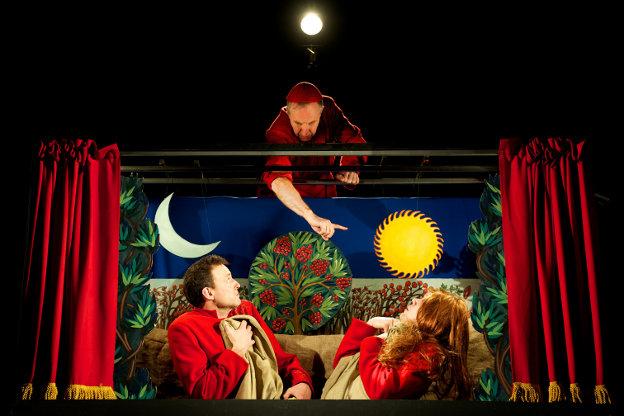British stalwarts Stan’s Cafe’s latest work mines a range of familiar comic theatrical tropes: the backstage action revealed, the deconstruction of well-known tales, and amateurs staging a performance. In The Cardinals the company set three red-robed cardinals the task of staging the (hi)story of the Holy Land, from Genesis to modern day Jerusalem. Inside a lo-fi puppet booth complete with wooden scenery, tatty drapes, cheap wigs and rough and ready props, the three cardinals take on the roles of the prophets and faithful. All the while they are (barely) tolerated by their female Muslim stage manager, who reluctantly and patiently keeps the self-absorbed cardinals on track.
There is a gentle, simmering ridiculousness that emerges from the earnest convictions of the cardinals donned in their bright robes which they cover with costumes that appear borrowed from a school play. A raised eyebrow or sotto admonishment punctures the atmosphere of reverence with which the tales of the Old Testament are told, whilst cassette tapes of the great chorales run out into not-quite-so classic pop songs, accentuating the ‘cultural selectiveness’ of the cardinals’ bible.
Despite the absurdity of the work, though, the conviction in the characterisation allows fleeting images to attain a rare numinous and deeply affecting quality – most striking of which is when God’s hand interrupts a ‘tea-towelled’ Abraham as he goes to strike his son Isaac dead with a wooden dagger, and then presents a painted wooden lamb for slaughter in Jacob’s stead. The play of physical tensions in this brief vignette transforms the ridiculous to the sublime, a poignant moment of what could be and what is. The staging of this intervention uncovers the power of these ancient tales and the potential of the personal relationship between God and the faithful. Seen in relief against the robust absurdity of the rest of the work these moments are all the more powerful.
But this work is no proselytisation – and as the piece shifts into its second half the oft-explored inhumanity of organised politicised religion is the subject of the growing pace of the narrative and muted conflict between the characters. This conflict builds into a chaotic finale, the puppet booth’s small stage crammed with the objects and machinery of modern power. This final descent into madness is a bleak and pessimistic one and as the ‘world’ collapses so does the theatrical artifice, leaving a dystopian vision of the cardinals’ failure to take command of, and responsibility for, the real world.


